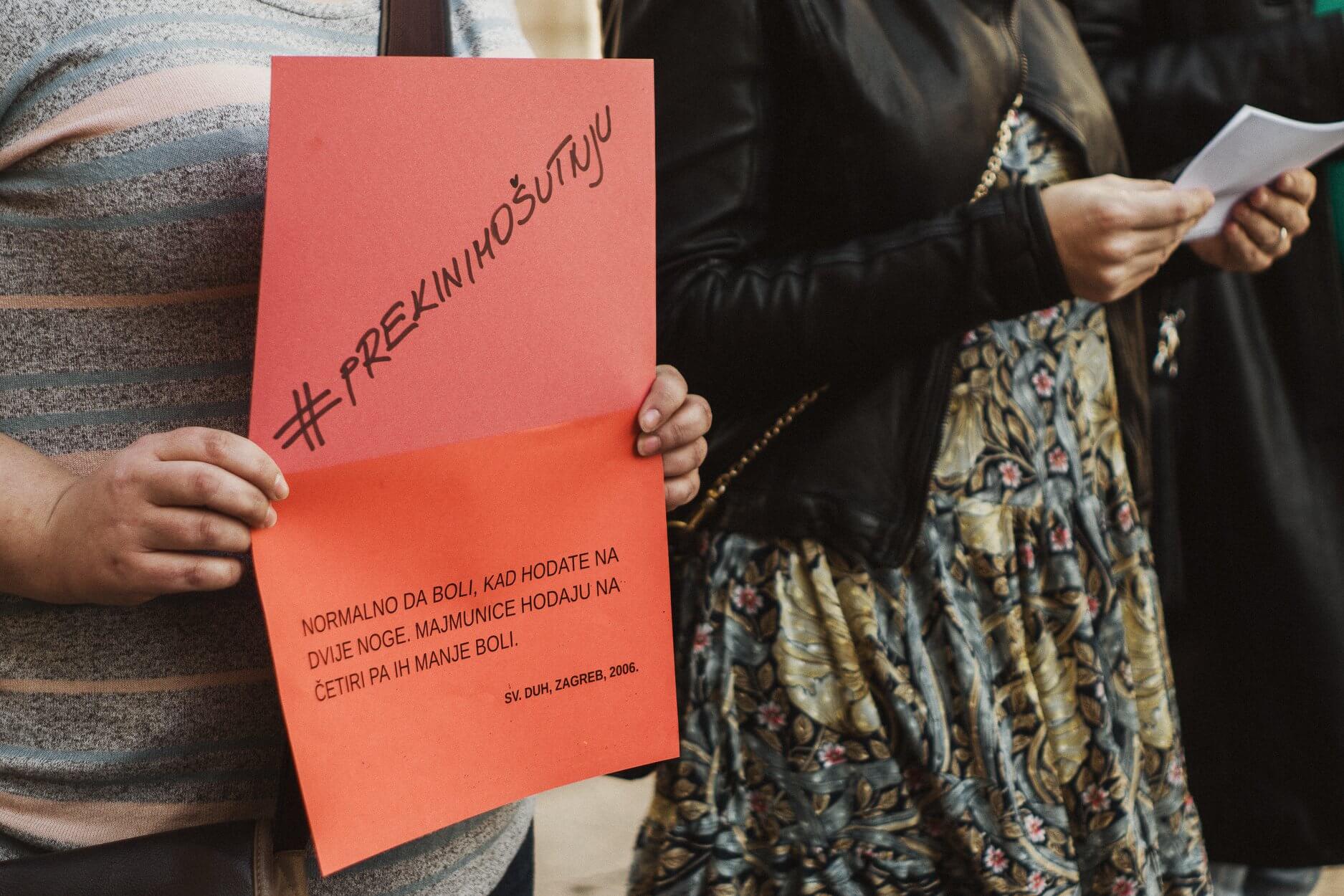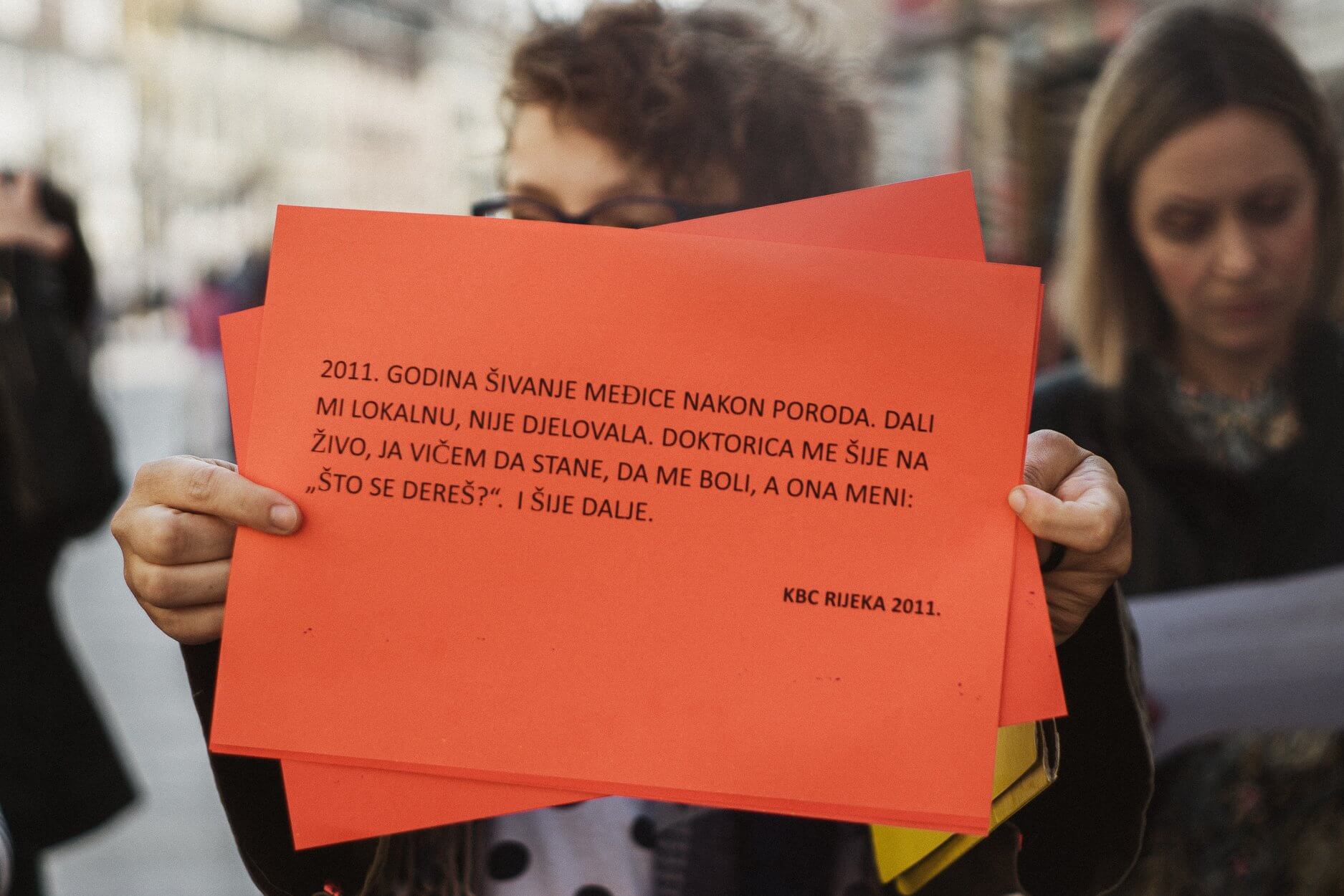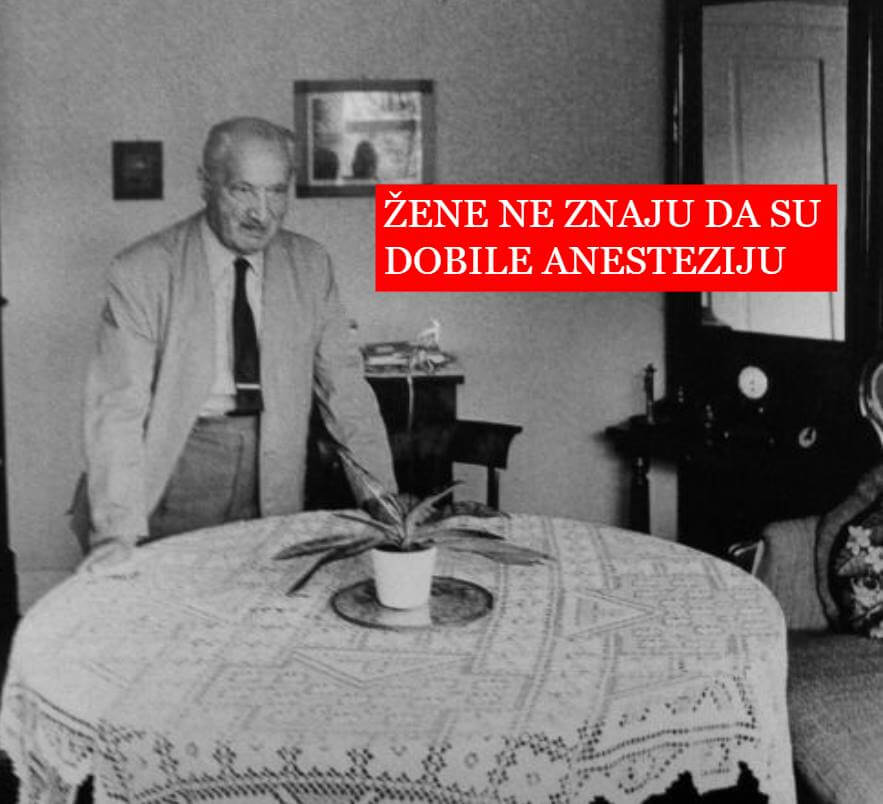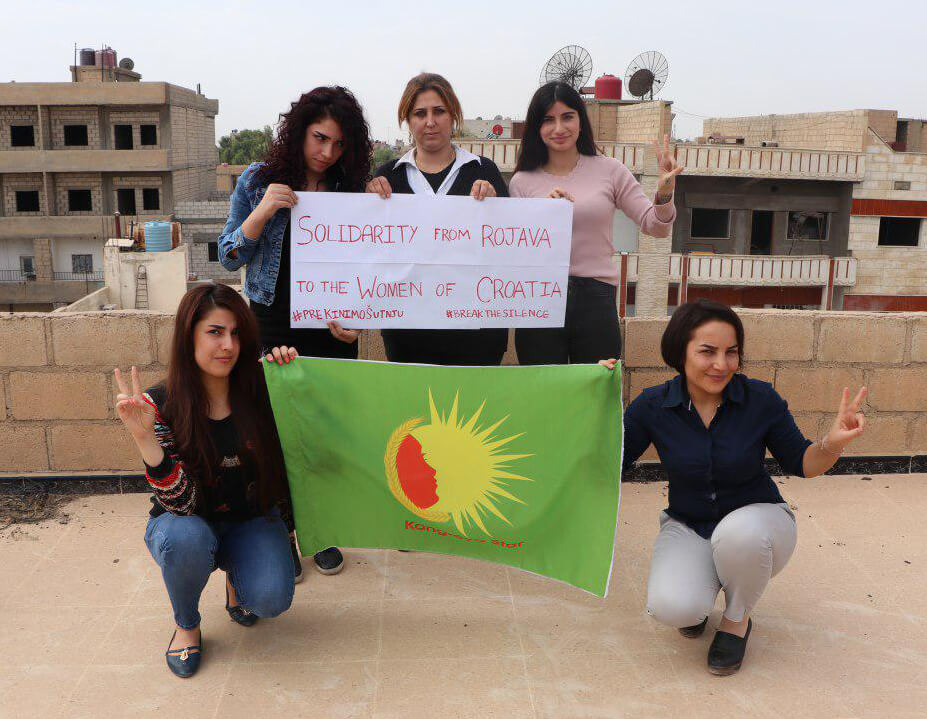“Cannibals coming out of my sex (…)” It is quite hard to grasp all the lyrics from the song “Cannibal babies” by LA based musician and artist Geneva Jacuzzi. I do really hope that Geneva doesn’t mind me using parts of her song for inspiration: imagine all those men in white (but sometimes women too), shockingly looking at women’s bodies, thinking that there must be something horrific inside. Being afraid for their own lives, they were, while floating above our spread legs, let’s just assume, “forced” to perform the following procedures:
*The doctor was stitching me up without anaesthesia, I was screaming how painful it was and she just said: “Why are you screaming?”
*Giving birth was the most painful experience ever. My intestine broke due to the strain. Stitching the perineum was so painful that I don’t want to give birth ever again. I still live with the consequences. The medical leave letter doesn’t mention any of this.
*My partner asked the doctor: is our little girl OK? He just said: it’s like with a new car, you never know.
*I’ve got “cosmetic stitches” in order to “look better for my husband” or at least this is what the young male doctor said while he was stitching me without anaesthesia. Those stitches broke when I got home.
*The doctor who was examining me was very angry because he was about to go home and it was Sunday. He was yelling at me because I was bleeding. Without any explanation about whether I needed to stay in hospital and get my things he said: “You don’t need anything for sure”. While I was crying he just said: “Why are you crying, that wasn’t a baby anyway!” Curettage was performed without anaesthesia, I had two nurses holding me, he didn’t even mention anaesthesia.
*Doctor: “Pain is normal when you walk on two legs. Female monkeys walk on their four, so it’s less painful.”
*When you were having sex, you didn’t cry. Now shut up!
We don’t need to imagine them, these are the horror stories that women are experiencing in Croatian hospitals. Although different horror stories of mistreatment of women during birth, or simply during an annual check-up at a gynaecologist exist in almost every family and among all generations of women, it took the voice of one female MP, and after the words said out loud in Parliament a part of the public started to question: are women really in pain? I must say “part” of the public, because there is always this doubt among others that women are, in the end, just very good at exaggerating.

On 11th October, MP Ivana Ninčević Lesandrić’s shared her personal story during the discussion in Croatian Parliament. She had a miscarriage, and consequently went through the process of curettage in a hospital. “They tied up my arms and legs, and started the procedure of curettage without anaesthesia. This means, scraping the cervix, the internal organ, without anaesthesia. Those were the most painful 30 minutes of my life. 30 minutes and I can recall every second of it because it seemed like an eternity.” The speaker of the House, Gordan Androković immediately said “You are now sharing a really intimate thing and putting me in a really uncomfortable situation.” The women are talking about pain, but he is the one who is embarrassed. The Minister of Health, Milan Kujundžić said that “this is not how it’s done in Croatian hospitals” promising that he will check on what “went wrong”. So he doesn’t know what is happening in hospitals.
They tied up my arms and legs, and started the procedure of curettage without anaesthesia. This means, scraping the cervix, the internal organ, without anaesthesia.
But this is not the first time that women in Croatia speak about the pain and humiliation they have to endure, although they scream in hospitals every day.
Back in 2016 the organisation Parents in action – Roda, an NGO that advocates for a dignified pregnancy, parenthood and childhood organised the campaign #BreakTheSilence (#PrekinimoŠutnju) but the response has been much stronger this time. Apparently, back in 2016 inspections were indeed held in hospitals in Croatia but since then nobody has seen the reports.
On the following Monday, after the discussion in the Croatian Parliament, Minister Milan Kujundžić received more than 400 letters from women sharing their own traumatic experiences in hospitals. Women were invited via social networks to write their experiences on paper, together with the location and a date, take a photo and send it to Roda. Many of them were dated in the past.

According to Deni Kurelović, head of the Clinic of Gynaecology and Obstetrics where Ninčević Lesandrić was treated, it is rather simple: “When experiencing pain, one screams even after a light touch.” Minister Kujundžić continued to discredit women in a similar, sceptical manner, saying that “The sting with the needle is sometimes so gentle that women think they have not been given anaesthesia”. Ante Ćorušić, notorious president of the Society of Gynaecologist said “No one ties women, we only put belts on them. It’s a process that helps women.” This of course provoked many furious reactions on the social networks.

On the other hand, the Croatian president Kolinda Grabar-Kitarović, a woman, remains silent. In the interview that she gave at the peak of this issue, she said that “the focus on different affairs is not good, because it is forcing people to move out of the country.” Not one word, let alone a cry, about women in pain.
As stated in one of the many articles written in the past few days, activist Nataša Vajagić says “it is so scary that today we are reading about stories happened 50 years ago. Generations are changing, yet misogyny does not fade. Medicine is progressing, but so is misogyny.” When it comes to reproductive and sex rights, the violence and humiliation, all of a sudden, are something private, something that we should all endure and forget, because those cases do sometimes end with healthy babies and somehow life goes on. But it doesn’t help to say “just bring you husband, they treat women better if they are accompanied by men”. Saying “I guess I was just lucky” simply doesn’t seem right and brings no consolation to numerous women with horrifying experiences, as scars continue to be a painful reminder on their bodies for the rest of their lives.
Saying “I guess I was just lucky” simply doesn’t seem right and brings no consolation to numerous women with horrifying experiences, as scars continue to be a painful reminder on their bodies for the rest of their lives.
Last Friday, activists gathered in public spaces and squares in different cities in Croatia and continued to read aloud experiences from Croatian hospitals. Roda is demanding the urgent adoption of the “Women’s Health Action Plan, which will include monitoring of the implementation measures and adequate budget funds, so that the government finally carry out their promises and implement measures in order to ensure that women are truly protected from humiliation, discrimination and reproductive violence.” On the same day, an online video was widely shared on social media with a message “This is happening in Croatia right now, please share and help us to raise international awareness!”
Just a day later, a response came from the Kurdish feminists, members of the movement Kongra Star from Rojava. They shared a video and a photo with a message of support to the feminist magazine Libela from Croatia, using the widespread slogan of the Syrian women’s movements “Jin, Jîyan, Azadî”, which reads “Woman, Life, Freedom” in English translation.
Very few women decide to make public complaints against doctors, midwives, nurses, or hospitals. Unfortunately, obstetric violence is an often overlooked type of violence against women.
This problem is universal and does not concern only one geopolitical territory. “So-called obstetrical violence, which includes the whole spectrum of dehumanizing practices – from forced medical interventions, through the failure to minimise the pain, to invasive procedures (such as spreading the uterus with a fist) – is a problem affecting women all over the world,” writes Katarina Pavičić-Ivelja on Libela. Consequently, this also means that this form of violence is not just happening due to poor health policies or insufficient equipment of the hospital. For instance, the term “obstetric violence” appears nowhere in US law, but other countries like Venezuela and Argentina are beginning to define it as a crime against people giving birth. Also, very few women decide to make public complaints against doctors, midwives, nurses, or hospitals. Unfortunately, obstetric violence is an often overlooked type of violence against women. Another problem related to widespread sexism and misogyny is that more and more studies shows that women’s pain is taken much less seriously by doctors than men’s pain is.

The MP Ninčević Lesandrić represents the centre-right party Most (Bridge) also known for being a vocal advocate for privatisation of the health system. So, while Ninčević Lesandrić wants better health care only for some, many of us will never give up on idea that good health care should be unquestionably available for everyone.
“I am actually surprised by the fact that this campaign (I was a bit suspicious at first) didn’t start to blame doctors individually, but rather pushed the agenda that this is a systemic issue,” says feminist activist Vedrana Bibić, “The question of reproductive health is extremely complex and cannot be solved solely by defending public health, although this has to be the first step. We have to be aware that even in a better redistribution of the budget, women’s reproductive health always ends with the worst setting. Therefore, we need to ask for a breakthrough, not just defend the rights that were previously [in Yugoslavia] gained.”
This might be just a beginning, but one friend and fierceful activist said last week: “We will fight back, and you will pay for this”.
![Political Critique [DISCONTINUED]](https://politicalcritique.org/wp-content/uploads/2015/09/Political-Critique-LOGO.png)
![Political Critique [DISCONTINUED]](https://politicalcritique.org/wp-content/uploads/2015/09/Political-Critique-LOGO-2.png)